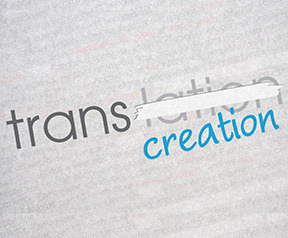Is there a transcreator in the house?
Medical Pharmaceutical Translations • Apr 27, 2015 12:00:00 AM

When I first heard the word “transcreation”, I was surprised. Did we really need this portmanteau? Shouldn’t all translation be not just about words, but meaning, as well? But when you think about it, not all translation clients – or translators – think this way. Many people consider translation to simply be a bare-bones affair, a “Just the facts, ma’am” situation. I’ve even experienced it myself: a potential client once contacted me to see if I could translate the complex copyright information on their website. When I told them I don’t do translations involving legal jargon, they looked at me in surprise and said, “It’s not hard – I just want you to write what the words say.”
But real translation, good translation – transcreation – can be very hard. Even if you’re not dealing with the simultaneous obscurity and precision of legalese, you still have to make sure you’re using the best words possible to convey, not just the meaning, but the feel and intention of the original document.
The term “transcreation” comes from the advertising and marketing world, and that makes sense: this is one of the most challenging and creatively stimulating areas a translator can work in. Often, for example, you have to take a catchy slogan and adapt it to another market. This not only means finding an equally catchy way to say it that’s at least somewhat similar to the original; as this article points out, transcreation also involves keeping details in mind like how words and ideas are perceived in other cultures, and even whether a logo or ad campaign image could come across as offensive, confusing, or otherwise a no-no. When you think about all those lists of translation blunders out there, you start to realize that not every client or ad firm has heard of “transcreation”, either.
Medical marketers are also ideally transcreators, and their “transcreations” actually affect many of us on a daily basis. Medical advertising or packaging texts, for example, are a risky area – a translator has to know the absolute most accurate way to give patients or customers information, and there are a lot of unexpected challenges. Take a straightforward sentence that just about any bilingual person could translate, like a message suggesting the patient get more information about a particular drug: in an insightful article, Joanna Laurson-Doube reveals that many countries have particular, standard ways of putting this that may not be direct translations.
Another challenge in both medical packaging and medical advertising translation is avoiding incorrect or false information. This is a lot harder than it seems; even if you think you know the right word, it could have multiple meanings that could turn out to be problematic, to say the least. “For example,” Laurson-Doube writes, “the English word “comfortable” can be interpreted in Finnish as ‘pain-free’ or ‘pleasant’.”
When it comes to ads, there are also legal requirements that differ from country to country. Many of us in the US expect a little hyperbole with our advertising, but not so in Poland: Laurson-Doube gives the example of a commercial that was banned from Polish TV because it seemed to suggest the drug it was advertising would provide instant relief and allow people to start working again immediately after taking it.
So if you’re planning to market your drug abroad, don’t think “translation”; think “transcreation”. Luckily, when it comes to finding a talented transcreator, you don’t have to look too far: just click here to see what our team at aiaTranslations can do for you!
#lifesciences #transcreation #medicalmarketing #translation #aiatranslations #advertising
